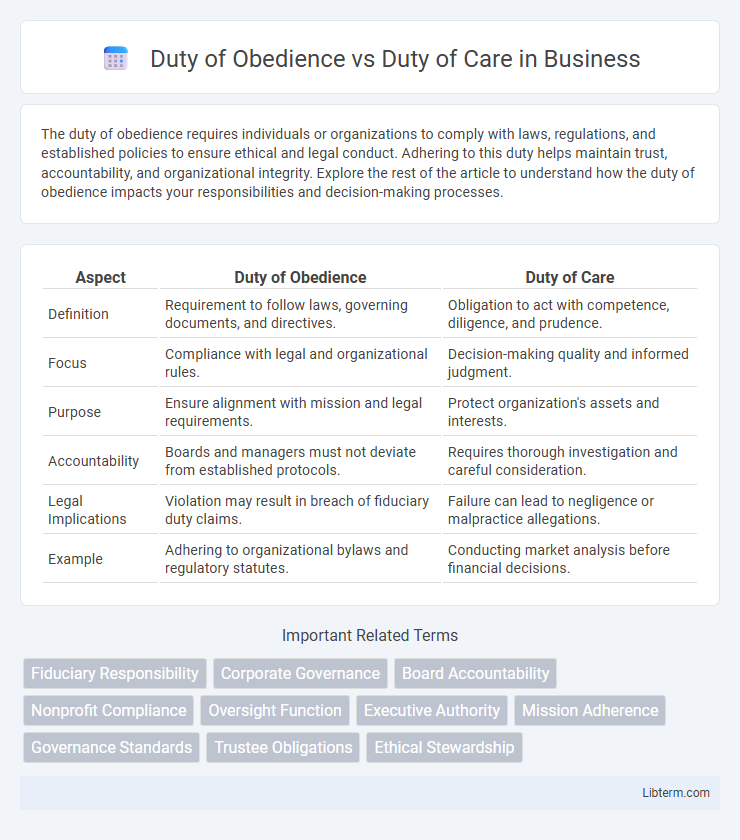The duty of obedience requires individuals or organizations to comply with laws, regulations, and established policies to ensure ethical and legal conduct. Adhering to this duty helps maintain trust, accountability, and organizational integrity. Explore the rest of the article to understand how the duty of obedience impacts your responsibilities and decision-making processes.
Table of Comparison
| Aspect | Duty of Obedience | Duty of Care |
|---|---|---|
| Definition | Requirement to follow laws, governing documents, and directives. | Obligation to act with competence, diligence, and prudence. |
| Focus | Compliance with legal and organizational rules. | Decision-making quality and informed judgment. |
| Purpose | Ensure alignment with mission and legal requirements. | Protect organization's assets and interests. |
| Accountability | Boards and managers must not deviate from established protocols. | Requires thorough investigation and careful consideration. |
| Legal Implications | Violation may result in breach of fiduciary duty claims. | Failure can lead to negligence or malpractice allegations. |
| Example | Adhering to organizational bylaws and regulatory statutes. | Conducting market analysis before financial decisions. |
Understanding Fiduciary Duties: An Overview
Fiduciary duties encompass the Duty of Obedience, which mandates adherence to the organization's mission and legal constraints, and the Duty of Care, requiring informed, prudent decision-making to protect the organization's assets. Understanding these core responsibilities ensures trustees and directors act in the best interest of the entity while maintaining compliance with statutory regulations. Balancing these duties is essential for effective governance and sustaining organizational integrity.
Defining Duty of Obedience in Governance
Duty of Obedience in governance requires board members to ensure that an organization strictly adheres to its mission, bylaws, and applicable laws, maintaining alignment with its founding principles. This duty emphasizes compliance and loyalty, preventing actions that deviate from the organization's core purpose. Board members must avoid unauthorized activities and ensure all decisions uphold legal and ethical standards tied to the organization's mission.
The Essentials of Duty of Care
The Duty of Care requires directors and officers to act with the competence and diligence that an ordinarily prudent person would exercise in a similar position, ensuring decisions are well-informed and based on thorough investigation. This duty emphasizes the necessity of due diligence, reasonable inquiry, and monitoring of the organization's affairs to protect the corporation's assets and interests. Neglecting the Duty of Care can lead to liability for damages resulting from negligent or reckless decisions that harm the company.
Key Differences: Duty of Obedience vs Duty of Care
Duty of obedience requires board members to strictly follow organizational laws, policies, and mission statements to ensure legal compliance and integrity. Duty of care emphasizes the responsibility to make informed, prudent decisions through due diligence and active participation in organizational oversight. Key differences lie in obedience's focus on adherence to rules and the duty of care's focus on informed decision-making for the organization's best interests.
Legal Foundations for Each Duty
The Duty of Obedience requires fiduciaries to adhere strictly to organizational laws, bylaws, and governing documents, ensuring all actions comply with legal and regulatory frameworks. The Duty of Care mandates that fiduciaries act with the prudence, competence, and diligence that a reasonable person would exercise in similar circumstances, grounded in common law principles and statutory requirements. Both duties operate under state and federal laws, including corporate governance statutes and nonprofit regulations, emphasizing legal accountability and risk management.
Practical Implications for Board Members
Board members must balance the Duty of Obedience, ensuring compliance with laws, regulations, and organizational bylaws, with the Duty of Care, which requires making informed and prudent decisions to promote the organization's best interests. Failure to uphold the Duty of Obedience can lead to legal penalties and loss of tax-exempt status, while neglecting the Duty of Care risks financial mismanagement and reputational damage. Practical governance involves regular policy reviews, thorough risk assessments, and diligent oversight to meet both fiduciary responsibilities effectively.
Common Pitfalls and How to Avoid Them
Common pitfalls in the duty of obedience include misinterpreting legal and organizational boundaries, leading to unauthorized actions, while the duty of care is often compromised by inadequate oversight and risk management. To avoid these issues, trustees and corporate officers must consistently reference governing documents and laws for obedience, and implement thorough monitoring, due diligence, and informed decision-making practices for care. Regular training and clear communication protocols strengthen adherence to both duties and minimize liability risks.
Case Studies Illustrating the Duties
Case studies such as Smith v. Van Gorkom emphasize the Duty of Care, where directors were found liable for inadequate due diligence during a merger decision. In contrast, the Duty of Obedience is illustrated by the case of Agudas Chasidei Chabad v. Gourary, stressing adherence to organizational bylaws and mission statements. These cases demonstrate the balance between ensuring informed decisions and maintaining fidelity to legal and organizational directives.
Tips for Fulfilling Both Duties Effectively
To fulfill the Duty of Obedience and the Duty of Care effectively, board members should thoroughly understand the organization's governing documents and comply strictly with applicable laws and regulations. Regularly reviewing financial reports, engaging in risk management, and maintaining transparent communication ensures informed decision-making and accountability. Implementing clear policies and ongoing education fosters a balance between adhering to the organization's mission and exercising prudent oversight.
Consequences of Breaching Fiduciary Duties
Breaching the Duty of Obedience, which requires adherence to an organization's mission and legal regulations, can result in legal penalties, loss of tax-exempt status, and damage to organizational reputation. Violations of the Duty of Care, involving negligence in decision-making or oversight, may lead to financial losses and shareholder lawsuits for failing to act with appropriate diligence. Courts often impose personal liability on fiduciaries when breaches cause harm, emphasizing the critical importance of compliance and prudent management.
Duty of Obedience Infographic

 libterm.com
libterm.com